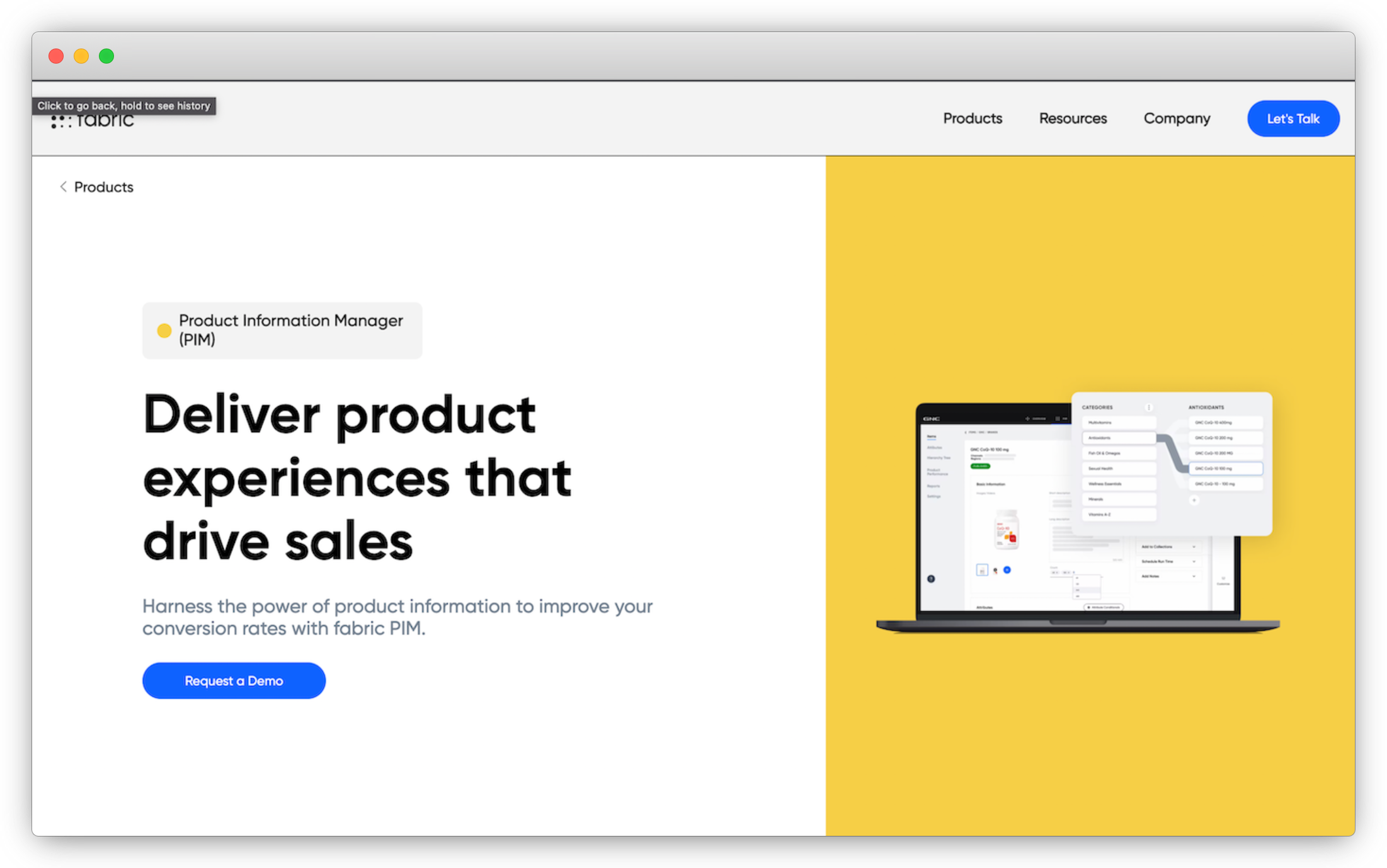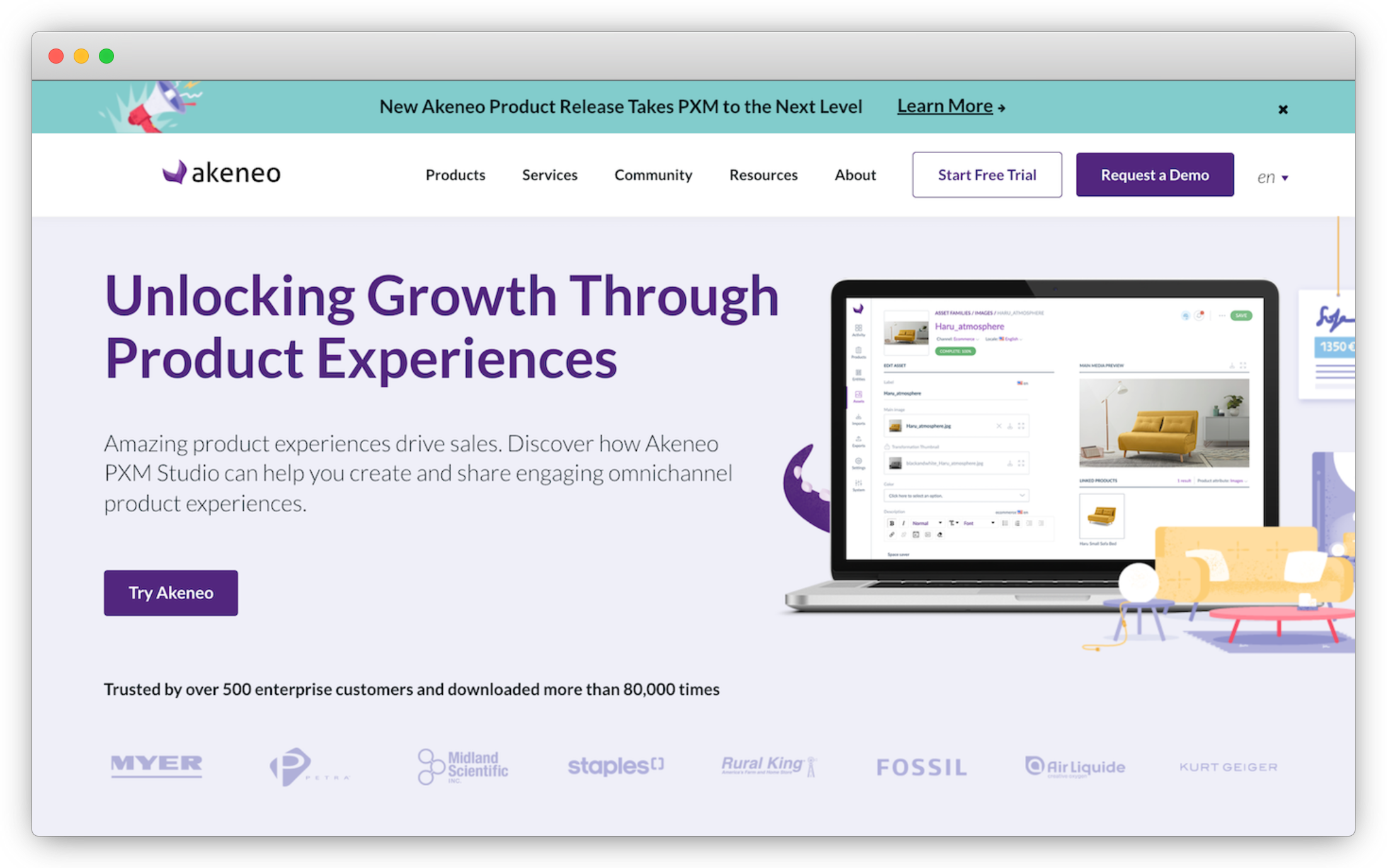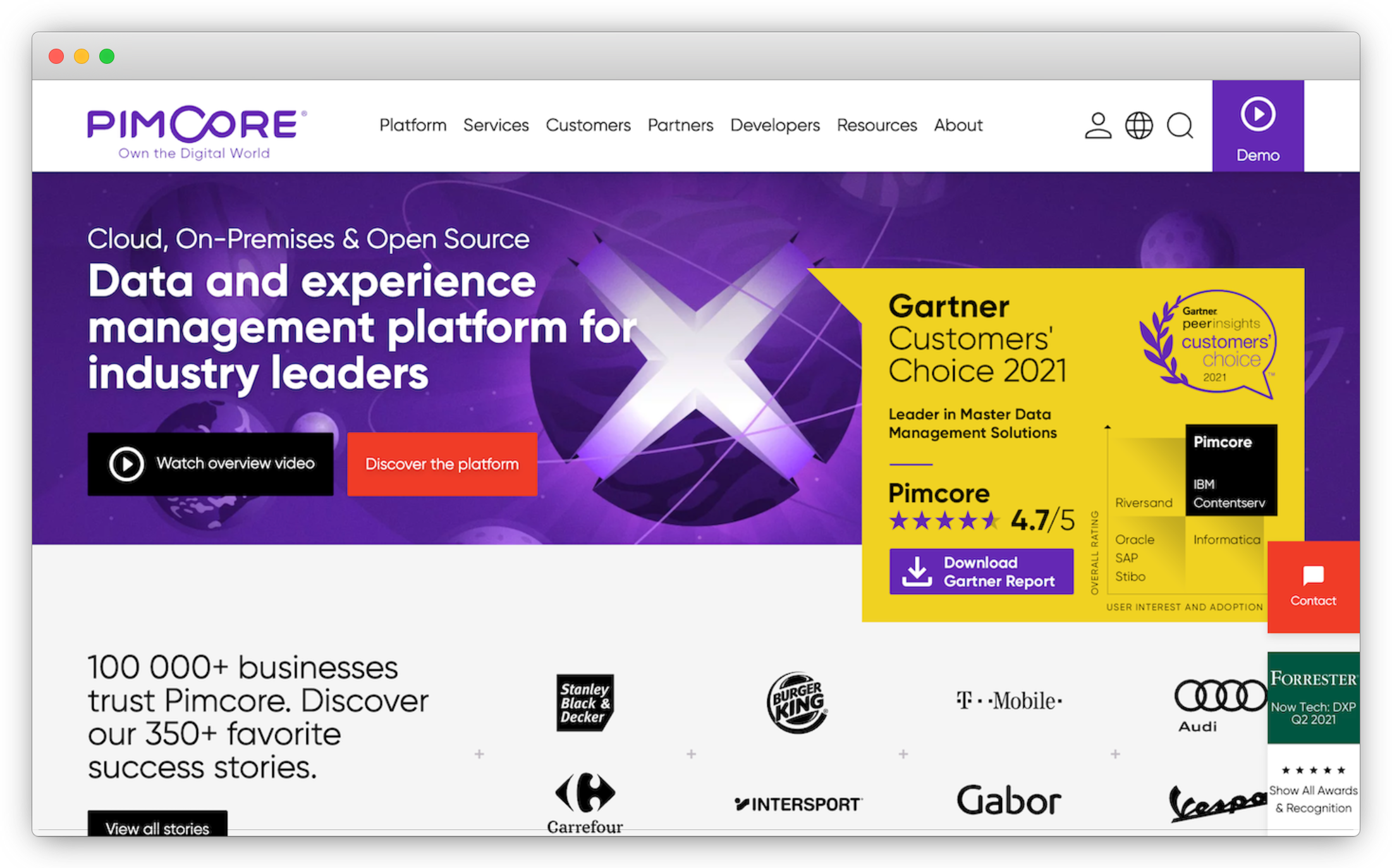The Top Cloud-Based PIM Software in 2023

Leading e-commerce brands are using cloud-based product information management software to increase conversion, enabling their customers to make informed decisions while providing a seamless shopping experience.
The best cloud-based PIM software makes it easy to import, export, and organize product data, allows for collaboration between users, and provides robust content analytics.
Some of the top cloud-based PIM software include fabric PIM, Salsify, Akeneo, and PIMCore.
With fabric PIM, retailers can quickly create, enrich, and manage product data at scale, increasing revenue and conversion.
In the e-commerce ecosystem, several elements come into play when determining the success of a business. One of these elements is product data. According to a Google survey, eighty-five percent of shoppers say product information and images are essential to deciding which brand or retailer to buy from.
As a result, e-commerce brands need good product data management for online success. Product information management (PIM) software provides a single platform to collect, monitor, and enrich product data.
An effective PIM software also helps create product catalogs while letting retailers distribute them to their sales and e-commerce channels. In this article, you will learn the essential features of the best PIM software in today’s market.
[toc-embed headline=”Features of Cloud-Based PIM Software”]
Features of Cloud-Based PIM Software
Here is a summary of some of the common features to expect from the best cloud-based PIM software.
| Feature | What it does |
| Ease of data importation | This allows multiple systems to integrate across the ecosystem to easily import and export product data. |
| Organization between users | This offers workflows for easy collaboration between multi-functional teams to efficiently work together in creating and managing product data. |
| Easy to use | This allows customers to get up and running in weeks and exceptional speed to value. |
| Content analytics | This creates versioning and audit trails to manage risks and control data quality. |
| Organization of product data | This allows for easy enrichment of product data by writing good product descriptions and classifying products in the right merchandising hierarchies. |
Ease of data importation
According to UPS, 73% of online shoppers consider extensive product information key factors when choosing products. This PIM software feature helps retailers respond quickly and efficiently to market changes and consumer demands.
The best PIM software can integrate with other software to perform functions that it was not initially designed to have. So when a new platform is added, existing PIM data is distributed throughout the system, enhancing scalability.
Organization between users
E-commerce companies that do not use a PIM or still use a monolithic PIM do not have the ease to work collaboratively on product data. Disparate product data can lead to low inventory levels, incorrect product descriptions and listings, and convoluted business processes.
This composable attribute of the best PIM software allows international e-commerce brands—which have teams and departments spread all over the world—to work in sync without any data management errors. This allows for consistent and dynamic product catalogs across the organization.
Easy to use
By leveraging the speed-to-value attribute of the best PIM software, e-commerce companies can easily understand what end users want and determine the most relevant items and information to present. As a result, retailers can deliver the highest possible value in a few weeks, benefiting from a speedy return on investment.
Content analytics
In large organizations, most data are subject to change. The content analysis feature of PIM software allows users to keep track of previous versions of product data. Version management makes it easy to revert to any previous version of the product information when needed.
The best PIM software also has an audit trail attribute that lets retailers review previous versions and understand what works well to deliver the best product experience to customers. This also boosts conversion as site visitors are presented with the data that resonates with them the most.
Organization of product data
Knowing the attributes of a product and viewing it from all angles can make the difference between a purchase or an abandoned cart. The best PIM software has a product data enrichment feature that helps online marketplaces identify and add missing information to their product catalogs. This makes it easy for customers to find relevant products.
[toc-embed headline=”The Top Cloud-Based PIM Software in 2022″]
The Top Cloud-Based PIM Software in 2023
There are many cloud-based PIM software, but only a few enable e-commerce companies to store and process product information according to today’s demand. Below are the top four cloud-based PIM software.
fabric PIM

Retail and e-commerce companies continually updating their PIM can use fabric PIM as a modern alternative. In addition to providing standard functionality, it supports collaborative workflows and provides an execution API. Collaborative workflows allow teams to efficiently manage their data, while the runtime API will enable them to serve large volumes of data in high-demand situations.
fabric PIM is also ideal for organizations that want to scale quickly without headaches. Companies can use fabric PIM to start decomposing their monolithic e-commerce stack without having to replatform entirely without disconnecting. They can then use other fabric modules or third-party services to modernize their e-commerce solution.
- Ease of data importation: fabric PIM is modular and composable making it one of the most modern PIM software today.
- Organization between users: fabric PIM has collaborative workflows that help teams across departments seamlessly monitor product data.
- Easy to use: fabric PIM is easy to use and can easily import, enhance, and organize product information.
- Content analytics: fabric PIM supports versioning and auditing.
- Organization of product data: fabric PIM enables bulk upload and data enrichment capabilities for large-scale catalog management.
Salsify PIM

Salsify was created in 2011 to provide e-commerce brands with the control and agility to manage product data. Its product experience management (PxM) platform uses the power of PIM to create a big business ecosystem that delivers actionable insights to product owners.
Salsify allows brands to manage cross-functional processes and track the progress of team tasks. Unlike traditional PIM software, Salsify allows people across the organization to access content relevant to their work, not just all its content.
- Ease of data importation: Its cloud-based ecosystem allows brands to connect to their external systems and third-party partners to seamlessly make the data exchange work.
- Organization between users: It makes it easy for teams to work together and locate accurate data whenever they need it.
- Easy to use: Salsify simplifies the product data management process across organizations.
- Content analytics: Salsify PIM offers organizations one central view for their data, with validation, versions, and auditing.
- Organization of product data: Salsify enables users to use external applications to enrich their product data.
Akeneo PIM

Founded in 2013, Akeneo creates solutions for retailers and merchandisers to unlock growth opportunities by creating a single source of truth for product data and delivering a consistent omnichannel product experience. Its advanced rights management feature makes it easy for project owners to create different types of users with varying access rights.
Akeneo PIM lets e-commerce brands easily and seamlessly collect raw product data from different file formats—such as Excel or ERP files—and bring it together in one place. This provides accurate product data to deliver a good customer experience.
- Ease of data importation: Akeneo PIM has dozens of integrations and integrates with other tools, making it easy to organize data.
- Organization between users: Akeneo has an enterprise edition, so it is suitable for collaboration between large teams.
- Easy to use: Akeneo PIM is intuitive and simplifies product information management.
- Content analytics: Akeneo helps restore products to a previous version and maintain multiple versions all in one place.
- Organization of product data: Akeneo’s Data Quality Insights empowers retailers to optimize product data enrichment.
PIMCore

PIMCore is an open source platform for managing user experiences and diverse data. The architecture of the PIMCore system is based on a holistic API-based approach and on the principle of “connecting everything.” This allows for advanced, bi-directional data exchange between different systems.
The fundamental and practical feature of the PIMCore platform is its ability to create both simple and highly complex data models. The software is suitable for managing millions of products, data, and links. PIMCore also makes it possible to easily and quickly export or import data, whether from ERP, or CRM.
- Ease of data importation: It enables advanced and bi-directional data exchange between different systems.
- Organization between users: PIMCore integrates into existing IT infrastructure and connects all data sources and allows teams to work in sync.
- Easy to use: PIMCore is easy to use and integrates easily with other external applications.
- Content analytics: All content in PIMCore (ranging from documents to assets and objects) is versioned.
- Organization of product data: PIMCore enables the consolidation of siloed and dispersed product data.

VP of Product @ fabric. Previously @ RevCascade and the Rubicon Project.